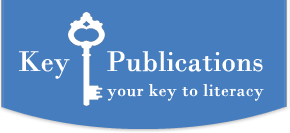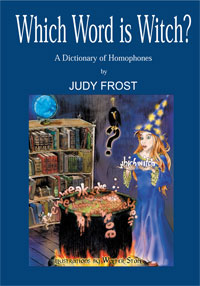Even with technology, your child still needs to be able to read and write...
“… My teacher kindly offered me a piece of advice - one sentence long – that reshaped my appreciation for education across the board for the rest of my life. ‘You know Carol,’ she said, ‘in order to write anything well, even the presentation of absurdity, you have to learn the laws of English like a master, so that you can break them like an artist.’ ” Caroline Myss, P. 43, “Sacred Contracts”, Awakening Your Divine Potential, Harmony Books, New York, 2001.
SO HERE’S YOUR CHANCE to help your children learn some basic laws of English…
Which Word is Witch? is essentially about homophones with some added helpful information about how to spell and use English words. Homophones are words that sound the same but are spelt differently and they have different meanings.
This book began with a small list and grew and grew. In the end we were surprised just how many homophones there are in the English language.
Homophones are very important because they are, in the main, commonly used words. If we use the wrong homophone, it can change the meaning of what we are writing completely. The illustrations in this book show how the meaning is distorted by the incorrect use of homophones.
“People find it hard to forgive you for spelling incorrectly, but they never forgive you for spelling homophones incorrectly,” said Matt, an adult who knows he has difficulty with spelling. “I wish there was a book that put the words into sentences, so I could see which word to use.” So Matt, your wish has come true. We have tried to find all of the homophones for you, but, no doubt, some have escaped our attention. You will find space at the end of the list to add your own. We hope there aren’t too many. Please write to us if you find more, so we can add them to the list for others to use.
Also included in this book is some basic information about the English language you may find useful. The English language is one derived from many different languages: Dutch, German, Ancient Greek, Latin, various Indian languages, French, Spanish, Italian — the list goes on.
English has also become a much-used language throughout the world. English usage does vary between countries that have it as a first language and can be confusing for people who use it every day, let alone those who try to learn it as well as their own language. This book has been written with great care to help people who are struggling with learning English and who are confused with homophones and how to use them correctly. We wish you all the best in your endeavours with English. The more you know about it, the more you will want to know. We hope this book whets your appetite.
P.S. Some of us rely heavily on spell-checkers on computers to do our spelling for us. Here’s a poem received as an email:
Subject: Don’t rely on technology: Date: Wed 26 Apr 2000
My Pea Sea’s Spell Chequer
Eye halve a spelling chequer
It came with my pea sea
It plainly marques four my revue
Miss steaks eye kin knot sea.
Eye strike a quay and type a word
And weight four it two say
Weather eye am wrong oar write
It shows me strait a weigh.
As soon as a mist ache is maid
It nose bee fore two long
And eye can put the error rite
It’s rare lea ever wrong.
Eye have run this poem threw it
I am shore your pleased two no
Its letter perfect awl the weigh
My chequer tolled me sew.
Sores Unknown
Armed with your copy of Which Word is Witch? you can correct the errors in this poem without a spell-checker, which obviously didn’t pick up the misused homophones.
Which Word is Witch? is suitable as a reference book for upper primary, secondary students, adults and students and speakers of English as a second language.

